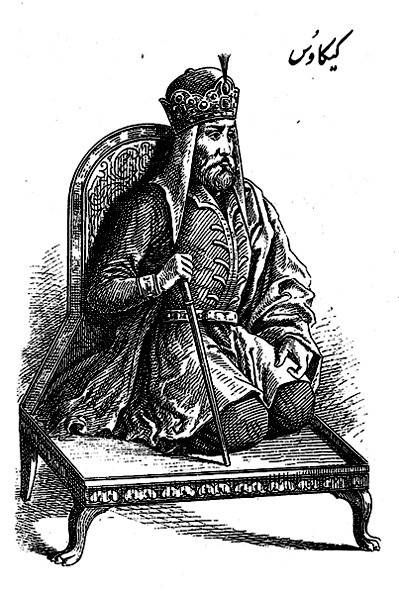Blog
Like Father Like Son?
Tags: Books, Shahnameh, Literature, Iran, History
 Illustration of Kay Kavus. Source: http://www.iranicaonline.org/articles/kayanian-v
Illustration of Kay Kavus. Source: http://www.iranicaonline.org/articles/kayanian-v
A recurring motif in Shahnameh is the struggle of generational succession and the effect, especially at the royal scale, of those successions. A multi-generational sacred or epic work can’t really avoid this as a by-product, of course: the Bible itself contains numerous such examples as it details the reigns of the various Israelite kings. In contrast to other works I’ve read that deal with generational succession in some way, Shahnameh concerns itself with the ebb and flow of fortunes that are tied to an individual king’s attitudes, the answer to the overwhelming question: will the son be like the father?
English has a few proverbs that have the same implication as the title. Wiktionary suggests:
In childhood, we grow to see ourselves as distinct from our parents, a new thing capable of whatever our dreams can conceive. This reaches a critical point in adolescence, our springboard into the wide world. From here, we gather together the imparted wisdom, the lived examples, and what we think of as our own unique ideas and issue forth, to fly or fall as far as our desires and efforts allow. Looking back now, I suppose the most surprising thing was not that the proverb was almost always true, but that exceptions to it ever arose. Overall, my experience is that the proverb is true more than it is not.
Ferdowsi begins his account of Kay Kavus’s war against the demons of Mazanderan with a brief discussion on the potential effect of differences in priority between father and son. Kay Kavus was a king who actively rejected the lessons of his father, Kay Qobad, as well as the kings before him. One region of the world, called Mazanderan, was the home of demons and sorcerers, a place that was notoriously difficult to conquer. Up to this point, the Persians had an unwritten rule not to conduct military adventures there, since it was a wasted effort (Warner & Warner):
Yet they attempted not Mázandarán —
The home of warlock-dívs and under spells
Which none hath power to loose; so give not thou
Men, wealth, and money to the winds.
Kay Kavus’s insistence on claiming the wealth of Mazanderan was a serious break with precedent, irrational even, and he acted against all of the advice of his chieftains.
Here is Ferdowsi, with his assessment. It’s worth having in both the Warner & Warner verse translation and in Davis’s prose translation.
W&W:
If ever mortal injury befall
A fruitful tree, when it hath waxen tall,
Its leaf will fade, its root become unsound,
Its head begin to bend toward the ground;
And when the stem is snapped off at the root
‘Twill yield its station to some fresh young shoot,
Resign thereto the garden’s burgeoning
And all the lamp-like lustre of the spring;
But if, my friend! an evil shoot should rise,
Let not the good root suffer in thine eyes.
So when a father leaveth to his son
The world, and showeth him the course to run,
If he shall flout his father’s regimen
Call him no longer son but alien.
He that abandoneth his teacher’s path
Deserveth every evil that he hath.
This ancient hostelry is fashioned so
That thou canst not distinguish top from toe,
And he that wotteth of its evil way
Doth well to quit it with what speed he may.
Davis:
If a noble tree grows tall and is then damaged in some way, its leaves wither, its roots weaken, and its summit begins to droop; and if it snaps, it must give way to a new shoot that, when spring comes, will bud and blossom like a shining lamp. If a sickly branch grows from a good root, you should not curse the root for this. In the same way, when a father cedes his place to his son and acquaints him with the secrets of life, if the son then brings shame on his father’s name and glory, then call him a stranger, not a son. If he slights his father’s example, he deserves to suffer at the hands of fate. This is the way of the ancient world, and you cannot tell what will grow from a given root.
The effect of this departure from precedent was disaster in the form of Kay Kavus’s capture at the hands of the div (demons), and he received an object lesson in the precise reasons his forbears had avoided conquering Mazandaran.